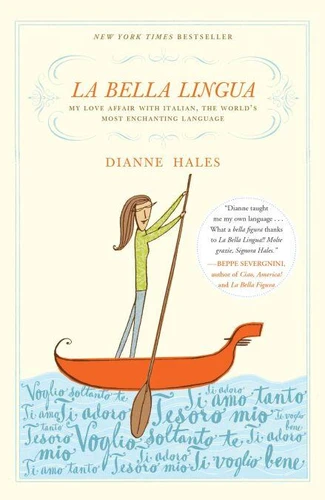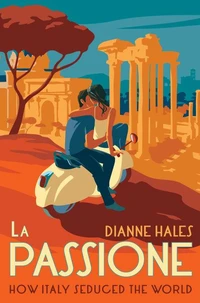La Bella Lingua. My Love Affair with Italian, the World's Most Enchanting Language
Par :Formats :
Disponible dans votre compte client Decitre ou Furet du Nord dès validation de votre commande. Le format ePub protégé est :
- Compatible avec une lecture sur My Vivlio (smartphone, tablette, ordinateur)
- Compatible avec une lecture sur liseuses Vivlio
- Pour les liseuses autres que Vivlio, vous devez utiliser le logiciel Adobe Digital Edition. Non compatible avec la lecture sur les liseuses Kindle, Remarkable et Sony
- Non compatible avec un achat hors France métropolitaine
 , qui est-ce ?
, qui est-ce ?Notre partenaire de plateforme de lecture numérique où vous retrouverez l'ensemble de vos ebooks gratuitement
Pour en savoir plus sur nos ebooks, consultez notre aide en ligne ici
- Nombre de pages320
- FormatePub
- ISBN978-0-7679-3211-0
- EAN9780767932110
- Date de parution12/05/2009
- Protection num.Adobe DRM
- Taille3 Mo
- Infos supplémentairesepub
- ÉditeurCrown
Résumé
A celebration of the language and culture of Italy, La Bella Lingua is the story of how a language shaped a nation, told against the backdrop of one woman's personal quest to speak fluent Italian. For anyone who has been to Italy, the fantasy of living the Italian life is powerfully seductive. But to truly become Italian, one must learn the language. This is how Dianne Hales began her journey. In La Bella Lingua, she brings the story of her decades-long experience with the "the world's most loved and lovable language" together with explorations of Italy' s history, literature, art, music, movies, lifestyle and food in a true opera amorosa - a labor of her love of Italy.
Over the course of twenty-five years, she has studied Italian through Berlitz, books, CDs, podcasts, private tutorials and conversation groups, and, most importantly, time spent in Italy. In the process the Italian language became not just a passion and a pleasure, but a passport into Italy's storia and its very soul. She invites readers to join her as she traces the evolution of Italian in the zesty graffiti on the walls of Pompeii, in Dante's incandescent cantos and in Boccaccio's bawdy Decameron.
She portrays how social graces remain woven into the fabric of Italian: even the chipper "ciao, " which does double duty as "hi" and "bye, " reflects centuries of bella figura. And she exalts the glories of Italy's food and its rich and often uproarious gastronomic language: Italians deftly describe someone uptight as a baccala (dried cod), a busybody who noses into everything as a prezzemolo (parsley), a worthless or banal movie as a polpettone (large meatball).
Like Dianne, readers of La Bella Lingua will find themselves innamorata, enchanted, by Italian, fascinated by its saga, tantalized by its adventures, addicted to its sound, and ever eager to spend more time in its company.
Over the course of twenty-five years, she has studied Italian through Berlitz, books, CDs, podcasts, private tutorials and conversation groups, and, most importantly, time spent in Italy. In the process the Italian language became not just a passion and a pleasure, but a passport into Italy's storia and its very soul. She invites readers to join her as she traces the evolution of Italian in the zesty graffiti on the walls of Pompeii, in Dante's incandescent cantos and in Boccaccio's bawdy Decameron.
She portrays how social graces remain woven into the fabric of Italian: even the chipper "ciao, " which does double duty as "hi" and "bye, " reflects centuries of bella figura. And she exalts the glories of Italy's food and its rich and often uproarious gastronomic language: Italians deftly describe someone uptight as a baccala (dried cod), a busybody who noses into everything as a prezzemolo (parsley), a worthless or banal movie as a polpettone (large meatball).
Like Dianne, readers of La Bella Lingua will find themselves innamorata, enchanted, by Italian, fascinated by its saga, tantalized by its adventures, addicted to its sound, and ever eager to spend more time in its company.
A celebration of the language and culture of Italy, La Bella Lingua is the story of how a language shaped a nation, told against the backdrop of one woman's personal quest to speak fluent Italian. For anyone who has been to Italy, the fantasy of living the Italian life is powerfully seductive. But to truly become Italian, one must learn the language. This is how Dianne Hales began her journey. In La Bella Lingua, she brings the story of her decades-long experience with the "the world's most loved and lovable language" together with explorations of Italy' s history, literature, art, music, movies, lifestyle and food in a true opera amorosa - a labor of her love of Italy.
Over the course of twenty-five years, she has studied Italian through Berlitz, books, CDs, podcasts, private tutorials and conversation groups, and, most importantly, time spent in Italy. In the process the Italian language became not just a passion and a pleasure, but a passport into Italy's storia and its very soul. She invites readers to join her as she traces the evolution of Italian in the zesty graffiti on the walls of Pompeii, in Dante's incandescent cantos and in Boccaccio's bawdy Decameron.
She portrays how social graces remain woven into the fabric of Italian: even the chipper "ciao, " which does double duty as "hi" and "bye, " reflects centuries of bella figura. And she exalts the glories of Italy's food and its rich and often uproarious gastronomic language: Italians deftly describe someone uptight as a baccala (dried cod), a busybody who noses into everything as a prezzemolo (parsley), a worthless or banal movie as a polpettone (large meatball).
Like Dianne, readers of La Bella Lingua will find themselves innamorata, enchanted, by Italian, fascinated by its saga, tantalized by its adventures, addicted to its sound, and ever eager to spend more time in its company.
Over the course of twenty-five years, she has studied Italian through Berlitz, books, CDs, podcasts, private tutorials and conversation groups, and, most importantly, time spent in Italy. In the process the Italian language became not just a passion and a pleasure, but a passport into Italy's storia and its very soul. She invites readers to join her as she traces the evolution of Italian in the zesty graffiti on the walls of Pompeii, in Dante's incandescent cantos and in Boccaccio's bawdy Decameron.
She portrays how social graces remain woven into the fabric of Italian: even the chipper "ciao, " which does double duty as "hi" and "bye, " reflects centuries of bella figura. And she exalts the glories of Italy's food and its rich and often uproarious gastronomic language: Italians deftly describe someone uptight as a baccala (dried cod), a busybody who noses into everything as a prezzemolo (parsley), a worthless or banal movie as a polpettone (large meatball).
Like Dianne, readers of La Bella Lingua will find themselves innamorata, enchanted, by Italian, fascinated by its saga, tantalized by its adventures, addicted to its sound, and ever eager to spend more time in its company.







